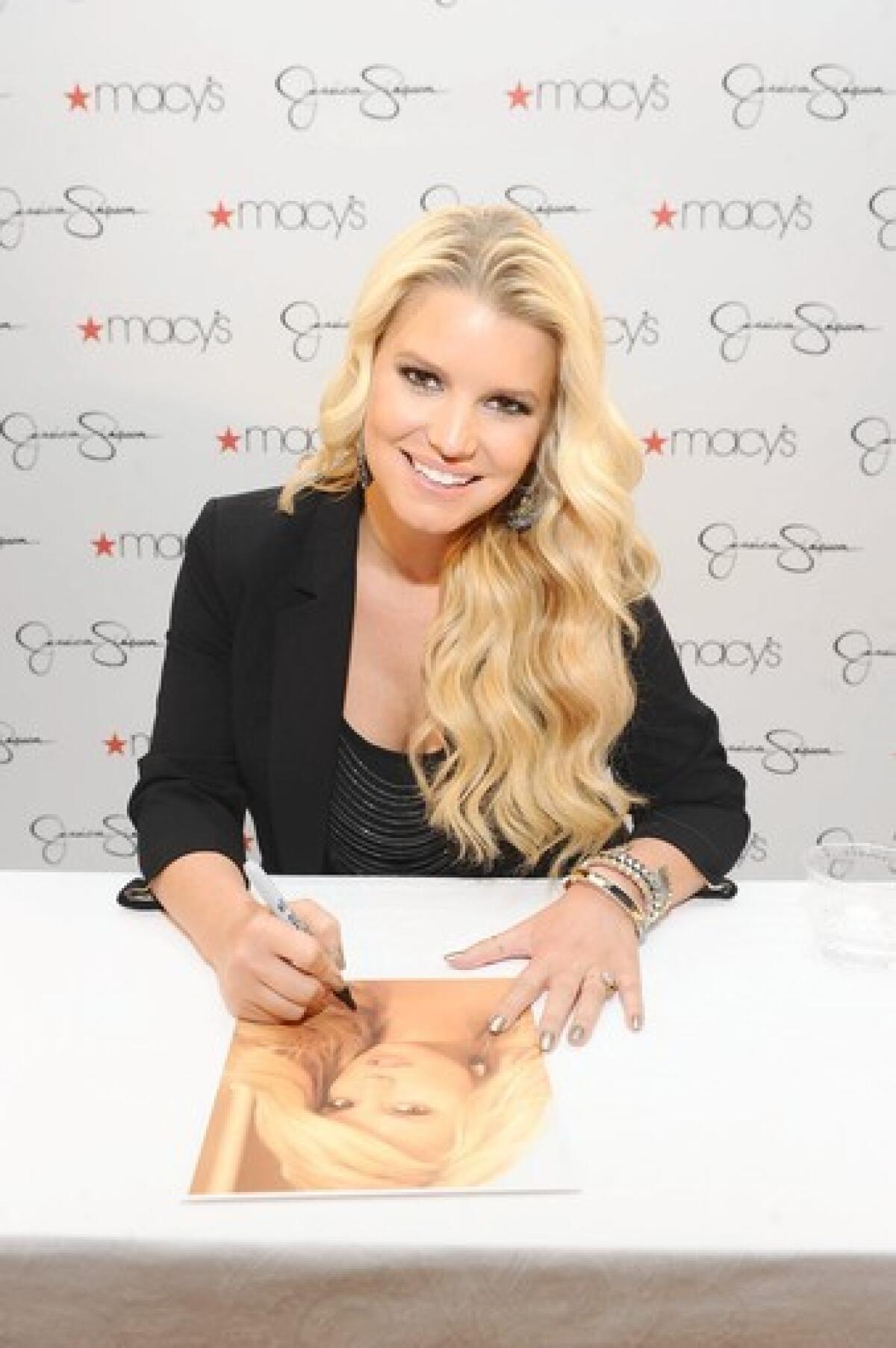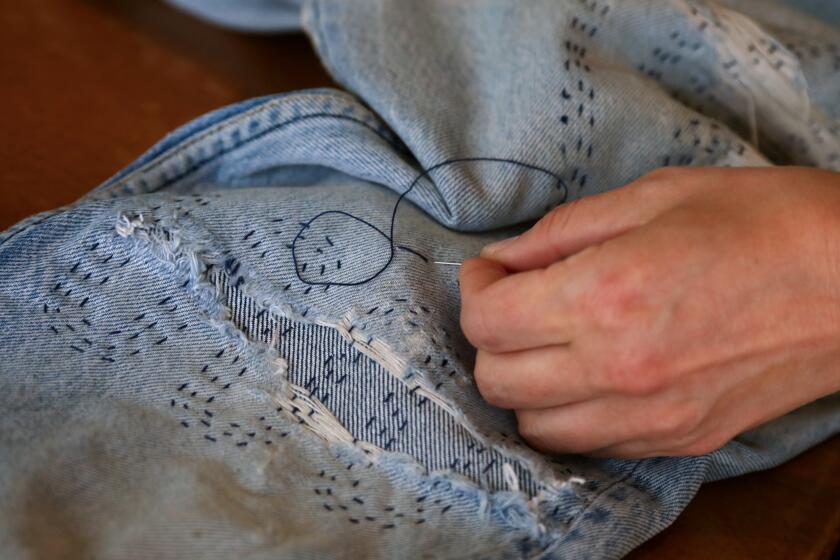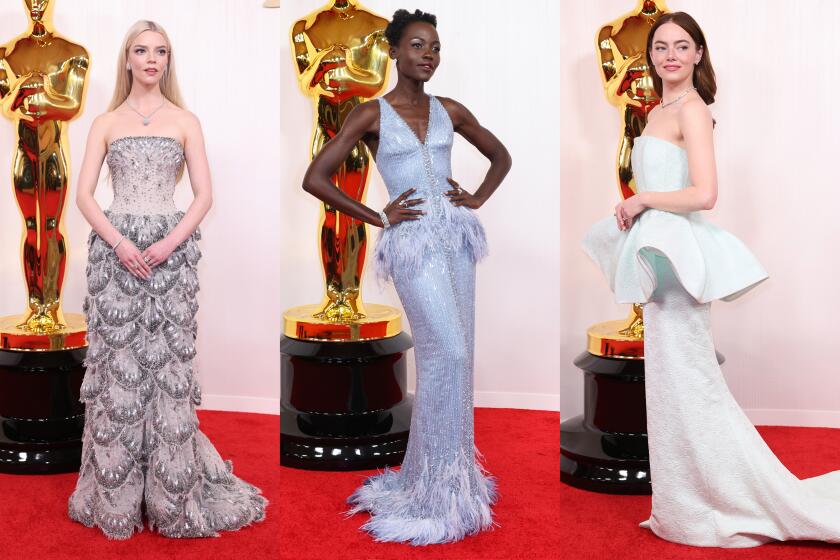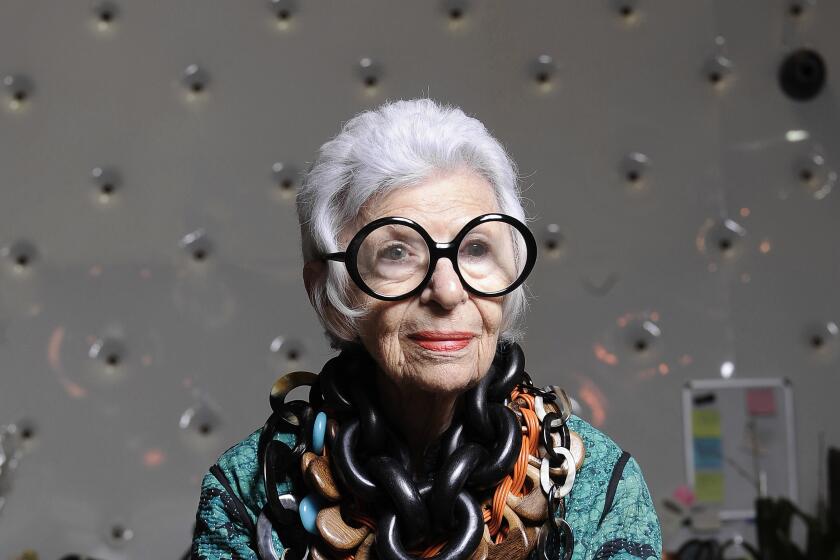Stars and style a good fit in celebrity product lines

Celebrity clothing brands have become a ubiquitous force in fashion, but this wasn’t always the case. A decade ago, attaching a famous name to a mass-market brand was still fairly rare and was seen by some as a last alternative when movie scripts and TV offers slowed down.
But now it’s not only acceptable, it’s almost expected.
Some celebrities are serious about fashion, such as designer-actresses Mary-Kate and Ashley Olsen, whose multiple lines include the Row and Elizabeth and James, and singer-actor Justin Timberlake, who has William Rast. Other stars inject their personal pop aesthetics into their brands, including Gwen Stefani with L.A.M.B and Harajuku Lovers, and Avril Lavigne with Abbey Dawn.
Star names catch the attention of consumers, but it’s the product that keeps them coming back.
Jennifer Lopez and the Kardashian sisters launched new lines over the summer amid much fanfare at Kohl’s and Sears, respectively, and they are likely to resonate with fans of the women’s styles as well as those who appreciate the inexpensive and cheerful appeal of the brands.
The licensing of high-profile names such as Kardashian and Lopez might seem like a no-brainer. (That’s especially true in the case of the Kardashians, as attaching their names and faces to a variety of products is their main claim to fame.) But what about the celebrity names without quite as much sizzle who have managed to parlay their time in the spotlight into successful and lucrative lifestyle brands that live on long after their fame has faded?
Jaclyn Smith was a pioneer, debuting her collection for Kmart in 1985, long before the “high-low” concept (a celebrity or big-name designer attached to a low-priced line at a mass retailer) of branding was cool. Twenty-six years later, Smith’s brand of clothing and home décor is still selling at Kmart. The retailer has since added Selena Gomez and her Dream Out Loud tween collection and Sofia Vergara’s women’s line to its celebrity clothing roster.
Former MTV VJ and television personality Daisy Fuentes also managed to leverage her fame into a fashion brand including more than 10 kinds of merchandise that has generated about $800 million in sales since it entered Kohl’s exclusively in 2004. Fuentes was the first celebrity name attached to the retailer.
“The case of Daisy Fuentes was a perfect storm,” says Dan Levin, managing director of West Coast operations for Beanstalk, a leading global-licensing agency that is responsible for the Mary-Kate and Ashley brand at Wal-Mart, among other high-profile licensing deals. “She was the first Hispanic name to go into apparel at Kohl’s. And back in the day when she started her line, the world was a different place. Celebrities didn’t want to get into [licensing their names to mass retailers or products] because back then it was seen as selling out.”
Selling out is clearly no longer a concern when it comes to the celebrity fashion game. In addition to Lopez and the Kardashians, Lavigne has her Abbey Dawn line at Kohl’s, and Lauren Conrad has a collection there too. Salma Hayek recently launched Nuance, a beauty line exclusive to CVS stores.
Fuentes, a relative veteran when it comes to fashion branding and licensing, attributes the success of her line and that of Jessica Simpson, who has the equally robust Jessica Simpson Collection, to a focus on longevity.
“To me, longevity has always been more important than fame,” Fuentes says. “I’ve never been the most famous girl in the room and never that interested in it.” She adds that she grew her brand slowly in order to learn the business and to understand which categories made sense to add as she went along. She started with sportswear and has since added multiple fragrances, eyewear, ready-to-wear, shoes and even bedding.
“Everyone and their mother wants a clothing line; it doesn’t mean everyone has a successful one,” she says. “When I started, there wasn’t a lot of people for me to follow, which is also why it made sense to start slow. Today, people [celebrities] have everything from sweaters to kitchenware, and it happens overnight. I started with basics, then worked from there.”
Simpson’s Jessica Simpson Collection, which started in 2005, has a whopping 22 categories and counting. Despite her singing and television career ups and downs, Simpson’s clothing and accessory sales remain up — according to Women’s Wear Daily, her retail sales are estimated to reach $1 billion by next year. The former pop star and sometime actress has a variety of merchandise, including coats, swimsuits, slippers and luggage, under her lifestyle umbrella. In her case, it’s the “relatability” factor that keeps consumers buying into her brand.
Simpson may not have released a movie recently, nor is she headlining the halftime show at the Super Bowl, but women relate to her weight issues, breakups and girl-next-door-with-a-hint-of-glamour sense of style.
“America certainly knows that Jessica may not be the world’s greatest pop or country singer, but she has also very clearly been out there with weight and relationship issues, she is very relatable,” Levin says. “People that are very relatable are what’s selling products today. Jessica is very relatable, and her brand is very attainable. It’s a testament to good management, a good manufacturer and a good retailer who really know how to use all of her assets.”
“It ultimately comes down to likability and authenticity, which are extremely important in maintaining consumer loyalty,” says Ryan Croy, brands division director at the Los Angeles-based public relations firm Fifteen Minutes. “While Jessica Simpson may have made a few bad business decisions in the height of her fame, she ultimately stayed true to her brand throughout her career. Consumers pay attention to this, which is why her retail brand is so powerful now even though her star meter isn’t as high as it was five years ago.”
While the financial success of Simpson and Fuentes’ clothing empires may be surprising in a sector of the clothing market that includes the red-hot Kardashians, Lopez and more recently Vergara as competition, musician Carlos Santana’s Carlos by Carlos Santana brand of women’s shoes, handbags and hats, is far more of a puzzle.
Launched in 2001, Santana’s line is well-known for the $89-to-$225 heels, boots and wedges most prominently carried at Macy’s. The gap between the celebrity and product is about as big as Paul Newman and salad dressing, yet both seem to work without consumers getting stuck on the disparity. And like Newman’s Own food line, Santana donates a portion of his sales from the fashion line to charity.
“There are always going to be exceptions to the rule. When news about the Carlos Santana women’s shoe line broke, people were scratching their heads, but they were also curious,” Croy says. “Then the shoes launched, and they were well-made, affordable and had a strong retail presence. Regardless of the disconnect, the brand ultimately delivered for specific audiences. In the end, product is king.”
Brian Dow, head of the branded lifestyle division at APA Literary & Talent agency, the company that secured the Kardashians’ collection at Sears, agrees that Santana’s shoes are a different spin on celebrity branding. “People are buying into a lifestyle or a vibe, and it works,” Dow says. “But again, that’s an exception. What they’re really selling with Santana’s line is a vibe.”
A celebrity face may snag consumers’ attention, but the quality and design of the product is what hooks them and makes them repeat customers.
“Once a consumer finds a brand they like, they’re loyal,” says Catherine Moellering, executive vice president of the Tobe Report, a New York-based retail trend consulting firm.
“With Jessica Simpson, her association with the brand is not a good thing or a bad thing,” she says. “At this point most consumers are buying it because it’s actually really good. Her sales of near a billion dollars are so disproportionate to where her fame is.”
So while fame might help leverage a celebrity’s clothing line, collection of lamps or anti-aging lotion, the long-term success comes with a solid product and a consistent relatability between the consumer and star.
In the case of Simpson those factors are seemingly all in place, even if her singing career is a fading memory.
“You know what? She’s still in Us Weekly, and if she’s in those magazines, people still care about her,” Dow says. “She may not have a Grammy, but she’s not gone.”



